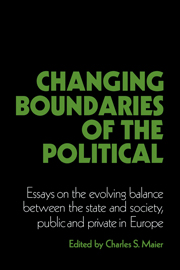 Changing Boundaries of the Political
Changing Boundaries of the Political Published online by Cambridge University Press: 05 June 2012
Introduction: three interpretive scenarios
No matter how natural it is to depict the family as the nucleus of private life, in fact it has long been a concern of public authority. But the nature of this public impact has changed. This chapter proposes a historical typology for the relationship of state and family during the last two centuries. To be sure, this is a history of the conceptual bases of the relationship, for actual practice was far less clear-cut, and carried forward older as well as more recent concepts.
Three scenarios in the history of Western societies are especially relevant. The first is the scenario in which the modern state came into being in France in the eighteenth and nineteenth centuries. The second is the welfare state as it took shape in Britain from the 1940s through the 1960s. The third scenario comprises the present day. Sociologists have advanced and debated several hypotheses to analyze these stages in the history of contemporary society. The terms “modern state” and “welfare state” can be used to summarize the first two phases. The third scenario has no clear designation, but the ideas of pluralism and complexity may provide the best interpretive guidelines for understanding its evolving interaction of state and family. I shall consider all three scenarios briefly in this introduction to set out the main lines of the argument.
For the modern state, the term bonheur public (“welfare” may provide the closest modern equivalent) became an issue of concern in the eighteenth century.
To save this book to your Kindle, first ensure [email protected] is added to your Approved Personal Document E-mail List under your Personal Document Settings on the Manage Your Content and Devices page of your Amazon account. Then enter the ‘name’ part of your Kindle email address below. Find out more about saving to your Kindle.
Note you can select to save to either the @free.kindle.com or @kindle.com variations. ‘@free.kindle.com’ emails are free but can only be saved to your device when it is connected to wi-fi. ‘@kindle.com’ emails can be delivered even when you are not connected to wi-fi, but note that service fees apply.
Find out more about the Kindle Personal Document Service.
To save content items to your account, please confirm that you agree to abide by our usage policies. If this is the first time you use this feature, you will be asked to authorise Cambridge Core to connect with your account. Find out more about saving content to Dropbox.
To save content items to your account, please confirm that you agree to abide by our usage policies. If this is the first time you use this feature, you will be asked to authorise Cambridge Core to connect with your account. Find out more about saving content to Google Drive.